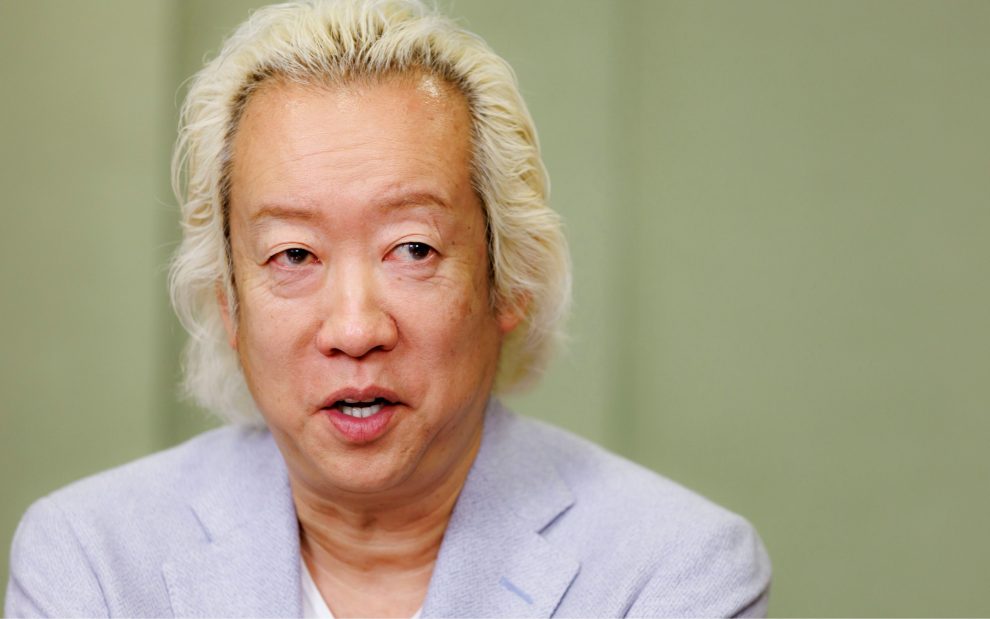Exclusive interview with Atsushi Fukuda (58), the new president of STARTO ENTERTAINMENT, in which he discusses the new organization, words from Takuya Kimura, the potential for a reunion of SMAP and King & Prince, the enduring essence of “Johnnyism,” and the company’s plans for global expansion.
On December 8, the name of the new management company created from the former Johnny & Associates was announced as STARTO ENTERTAINMENT.
At the same time, the management team of the new company was also revealed, with Atsushi Fukuda (58), representative director of Speedy Inc, taking over as new president.
Fukuda is known as a pioneer in Japan of the “agent system” being adopted by the new company, having been the agent of actress “Non” (Rena Nonen) for seven years. He has been a harsh critic of the old-style Japanese entertainment industry, symbolized by so-called “slave contracts” that aim to discourage inter-agency transfers or career independence, as well as “barter appearances”, in which a company’s younger and less experienced talent are pushed into a role as a condition of the casting of a more popular talent, both of which have been alleged as longtime practices of Johnny & Associates.
Why did Fukuda decide to become president of the new company? And how will he lead the 160 talents? Read below for an exclusive 150-minute Shukan Bunshun interview with Fukuda.
Shukan Bunshun has been harshly critical of the state of the Johnny’s Office in the past, including its special campaign on the sex abuse allegations in 1999. Why did you choose us to be the first for an in-person interview?
The mainstream awareness of the late Johnny Kitagawa‘s allegations started with Shukan Bunshun, so I felt our new company should also start at the same place. I thought it would be good for the company to start off by speaking to Bunshun, who has a solid understanding of the overall situation, and in my own voice so as to make my feelings about how we proceed perfectly clear and without any lingering questions rather than relying on some generic PR set-up.
In short, I think our new company should be born with the blessings of society, and to that end I wanted to speak first to the media which has taken the harshest stance toward our past.
The new company is completely separate from SMILE-UP., which provides compensation for sexual assault, but what do you think about the allegations?
Up until the October 2 press conference hosted by Johnny & Associates, I had only watched the situation unfold across the mainstream news channels like the rest of the general public. My initial thought was, as it was for most people, “Wow, this is a really serious situation.” What he is alleged to have done is a serious crime and one that cannot be forgiven nor forgotten.
How did you decide on the name of the new company, STARTO ENTERTAINMENT?
When we put out a public call for company names to all members of Family Club, we received a total of 140,156 submissions. Most of them were derivations of the original name, which while clever were not possible to use, so we consulted with external copywriters and designers and settled on “STARTO ENTERTAINMENT”, which had been submitted by eleven different accounts. While there were a number of other compelling submissions, all of the members of the consideration team immediately felt that this (STARTO) was the one. STARTO comes from “STAR” (as in, the artists), and “TO” as in “moving to the future together. The design itself also invokes a sense of us all standing with arms around each other’s shoulders.
How were you approached about becoming president?
First, an acquaintance from an NPO invited me to meet with Julie (Julie Keiko Fujishima, the former president of Johnny & Associates). Honestly, I was extremely surprised. I had witnessed a series of news reports and thought a lot about why I may have been invited, and initially approached the meeting with mixed feelings. It was about a week after the press conference, around the 10th or 11th of October, something like that.
What was your impression of Fujishima at that time?
It was shortly after she had decided to abolish the name of Johnny & Associates, so she seemed rather subdued, but on the other hand I could immediately tell she was an extremely talented business woman. I didn’t get the impression that she was the monster so many had made her out to be over the years, and thought she spoke in a very logical way about what needed to be done.
What was discussed there?
It had already been revealed at the Johnny’s press conference on October 2 that they were switching from the previous management contract system to a more flexible agent system, so we talked about how that works in the US / Hollywood and specific inherent business issues. I had been the agent of Rena Nonen, aka “Non”, for seven years; and in 2019, when the Fair Trade Commission came down on Johnny’s over the SMAP issue (allegations of pressuring TV stations not to engage with ex-members of SMAP), I had been interviewed by the media and talked about what freedom means for talents in this day and age. Julie asked me some very detailed questions, and I answered them as best as I could. I thought it was a big deal for such a huge entertainment company to allow talents more freedom to transfer outside of their own infrastructure, because, in the end, everyone wins.
How did joining the new company come about?
At the time, I was approached just to be an external director. I will be the first to admit that I have historically been critical of the old Johnny’s and have a very different mindset from how things should be run. However, and I have always said this, my feelings are not limited or specific to Johnny’s, but the systems that govern Japan’s entertainment industry.
A lot of what is still common practice here is held over from after the war, and the production company practices managing singers and other performers active on US military bases. Those got locked in during the 1980s TV boom, but now are over 80 years old and desperately need to be updated. In the United States, entertainment industry agents / representatives need a business license to eliminate problem people and protect the talent as workers, but here you don’t need a business license, and there is no regulated legal framework, so business is conducted mainly by verbal agreements. This naturally results in all sorts of uncertain mechanisms and unstable relationships with TV stations and other media outlets. The timing is right for such a business model to change and change dramatically. So, I felt that my being named as an outside director to a major player in that system could help push reform in the Japanese entertainment industry.
The position and authority of an external director and president are completely different, so how did you go from being approached as an external director to becoming president?
When I was first offered the position, I turned it down. I thought it was impossible to take on such a heavy responsibility, made all the more difficult having been exposed to so much public criticism, but there were several triggers for my change of heart.
One of them was the presence of Higashiyama (Noriyuki Higashiyama). I spoke with Higashiyama several times before accepting the presidency, and he is full of charm and has a really strong sense of responsibility. I once read in some magazine that Higashiyama had stated that he would work as an entertainer until he was 90 years old, so the fact that he chose to quit the job he loves most for the sake of taking on the responsibility for his own management despite a lack of experience moved me.
Another thing was that I was excited at the idea of helping to revive Johnny’s. So many young people have come to Johnny’s because they want to be like Kimura (Takuya Kimura) or Matsumoto (Jun Matsumoto), don’t they? There is such a “lineage of beautiful senpai” and everything they have done in the worlds of singing, dancing, and theatrical content has historically influenced Korean entertainment, which is now popular around the world. If you think about it, such a huge entertainment group is a treasure of Japan. With over 35 years of experience in the entertainment industry myself, I decided to give it a try.
But I knew that if I were to do it, I’d have to be able to function as a president. What the president needs above all is authority over budgets and personnel, something not held by a mere external director. In the course of those discussions, on the night of October 31, the rumor of my appointment as president came out and the next morning, I was flooded with messages from people I knew. But in all truth it was not officially settled at that time.
Did you have any requests from Fujishima about how she wanted you to handle the company?
None whatsoever. Also, it should be stated that it wasn’t Fujishima, but Inohara (Yoshihiko Inohara) who asked me to be president. When I was explaining about my own work with the agent-style system, he said, “Well, then, you should help us do it!”
Did Inohara give you any specific requests for what he wanted you to do?
Inohara is a very good communicator, and he is open about having become a board member as a result of all of these things without any specific knowledge or training in executive management. Conversely, I understand business management, but I don’t know anything about cultivating talent. So, we’re dividing the roles between us, and I look to him to teach me about that side of our business. Needless to say, we are together every day.
I was told that you have interviewed all 160 talents since you were appointed president. Who did you speak to first?
Of course, Kimura. He was the first.
What did you talk about?
That is confidential. However, though he did not say this directly to me, I heard after the fact that he was very appreciative of our conversation. Thanks to the successful interview with Kimura, I was helped a lot afterwards. Kimura is now the eldest son of the company, so if he were to think, “Who the hell is this guy?”, I would lose all credibility instantly. That kind of deference to seniority is well established here. It’s like the Ishihara Corps of today.
There is a LINE group for Kimura and other talent, no?
I didn’t realize you knew about that. Bunshun’s formidable reputation is well earned.
(Laughter) I think it was in that LINE group that the impression of Fukuda was conveyed.
So it seems.
I guess his opinion of you was conveyed in a good way?
I was curious about how it was written, word for word, so I asked about it later. It was quite well written. Perhaps it’s a strange thing to say, but it brought tears to my eyes.
Does this mean that Kimura was able to feel your enthusiasm?
I was nervous when I met Kimura. After all, he is a big star. Besides, the agency was in crisis and the press was saying, “Aren’t all the talents quitting?” so I had to talk to him. I still hadn’t formulated my thoughts perfectly on the matter, but I tried my best to talk to Kimura about the future of the agency, and I think he probably understood me. I think that’s why he said in that LINE group that this guy (me) might have a shot.
When did you meet with the other talent?
Every day, from morning till night. There were days when we started at 8 AM and the last meeting wouldn’t begin until after half past midnight. Everyone is busy, so it’s after the recording of TV programs or dance rehearsals. Some of them have been away from Tokyo on location for dramas or on business trips, so I haven’t met them yet (as of this interview), but I have seen everyone I could.
Did you also meet with Ohno (Satoshi Ohno) of Arashi, who is on a break from his talent activities?
No, I haven’t met him yet. He is in Okinawa.
What did the talents talk about in the interviews?
Most of them asked about the specifics of our new organization. Things like, “What is an agent system? What are its benefits?”
When will the contracts with the talent all be decided?
As nice as it would be to have everything completed by the end of December, that’s simply not feasible, and we are also helping many of them set up their own companies as well. My goal is to have our new company fully operational by spring of next year.
Are there many people who choose to keep their management contract rather than an agent system?
Yes, there are. Most of our artists work on a group basis, and there are certain patterns where a talent’s group activities will be handled under a traditional management contract while their individual activities are done under an agent-style agreement. However, in that case, I have been very firm that group activities should be given priority. Otherwise, if someone were to say, “I have to go on location for a while, so I can’t participate in such-and-such concert,” then we would have a problem. That has been a key point in all conversations.
Are there those who choose to simply keep the same management contracts as they have in the past?
Many who just want to concentrate on their art and are not concerned with any need to set up their own company have indeed chosen to simply renew their management contract, with little change from before. However, it is important for the talent themselves to choose what works best for them from among all available options.
Are there talents who will choose neither a management contract nor an agency contract and leave the agency?
Of course. The most important thing is to allow the talent the freedom to move on, if that’s what they want. We would never try to bully them into thinking they would have no work without us, and we would even like to provide a platform for talent who have left us but want to come back.
Even now, we give advice to talents who have decided to set up their own business. Even down to minor details like, “When you set up your own business, the first thing you need to do is create a website and create an inquiry form like this.” Japan as a whole has lost a lot of ground to South Korea in recent years, and we want to boost the Japanese entertainment industry and compete on a global scale. I hope that the total amount of energy in the Japanese entertainment industry will increase thanks to these reforms.
I would like to ask you about the structure of the new company. Inohara will be appointed COO, but he will also serve as a board member of SMILE-UP.?
No. As soon as the new company officially switches from a simple preparatory company to a full-fledged one, he will fully transition. None of the directors will serve both companies concurrently.
Please tell us about the selection of the other officers, such as Chief Financial Officer Kazuhiro Tatsuki, Chief Compliance Officer Mika Wada, and External Director Shinichiro Tsukuda.
Tatsuki is a certified public accountant and formerly a partner at Yotsuba & Co., very capable of running the company’s finances properly. For our CCO, we were particularly careful in the selection process given the company being under severe scrutiny in terms of compliance and governance, but Wada is a human rights lawyer and has been involved in relief activities for the affected areas in Fukushima Prefecture. Tsukuda is one of the founders of @COSME as well as a business manager who has successfully helped various ventures.
When will the company be established? And what will the shareholder structure be like?
A preparatory company has already been set up, and we plan to establish the main company in December. We will decide on the shareholder details at a later time, but basically it will be that some shares are held by executives and some shared by the employees. No money or investment will be derived from the founder’s family. Furthermore, we are sticking to our previous announcement of not accepting any commercial income until September 13th of next year–all money going directly to the talent–but looking at the current figures, so long as we can have enough working capital for nine more months, we can get by after that.
Where will the new company have its offices?
I searched really hard for a building that would accommodate 250 employees, and I approached more than 10 realtor companies, but most of them turned me down. I knew it would be hard being a brand-new company without any credibility right now, but we finally found a good place and are in the process of signing a contract. Hopefully by spring next year, I’ll have the interior all ready and move in.
The money will come through bank borrowing. It’s not easy to get a loan, so I even went round to the regional banks. I was almost in tears of joy when one of the regional banks offered me a loan, but I was told for just ’20 million yen’, and I lost my shit (laughs).
Prior to now, you have criticized barter appearances as ruining Japanese dramas. The Japanese entertainment industry has long adopted a strategy of having young talents appear as bartered actors in dramas in which bigger stars appear in order to raise their profile, but will barter appearances be eliminated in the future?
When one of our artists receive an offer to play the lead role, I don’t think it is unfair or strange to recommend a newcomer we represent for additional consideration as part of negotiations. However, if we were to say something like, “If you don’t use this new talent, we won’t give you the lead,” that’s basically blackmail, isn’t it? In the future, we will ensure that such bad bartering does not take place.
Won’t young talents who have seen this kind of barter system be worried about whether they will be properly marketed when the Fukuda system comes in?
If a young actor were just looking for such a package deal as their only chance or opportunity, I’d have to tell them to stop thinking like that. The strengths that this agency has always had are totally different from those of other entertainment enterprises. We promote as a group and build a fan base, and this extremely special business model provides opportunities for TV commercials and other offers. It’s a bit hard to imagine that someone wouldn’t be able to sell simply because we have a new business structure. If a group can become popular, there’s no reason any individual member wouldn’t get offers of their own.
Is it possible to work with who have left Johnny’s, including former members of SMAP, and Number_i, the group of Sho Hirano, a former King & Prince member and current member of TOBE?
It’s totally OK. The idea of inter-talent co-star blacklists is such a myopic consideration to the neighborhood of Minato (where many of the major agencies are located). We must work together in the fight against bigger competitors and to go global. I think it would be good if we could do any combination that everyone thought was appropriate for the content, and if the deal is mutually beneficial. The fundamental philosophy is that you should be able to perform with anyone, and after all the entertainment companies are not in a position to give the “no-go” in the first place. The producer of the TV station that casts the talent has the right to organize as they see fit, as they also have distribution rights and IP (intellectual property) rights. The TV stations can decide for themselves on matters of casting.
The break-up of SMAP still leaves a very strong impression. The late Mary Kitagawa nominated her daughter Julie as successor, and this nationally-reknown group parted company when Michi Iijima, SMAP’s manager, was told to leave if she had a problem with it. Is there a possibility of a reunion?
That is up to them and what they want to do. At present though, there are no arrangements that I am a aware of.
“If you want to do it, you should” sort of thing.
I think everyone should be free to do what they want to do. Even if they leave, if they want to come back later, they can, and if they want to transfer to somewhere else, they can. The fact that the entertainment industry up until now did not have that freedom was unusual and problematic. As long as it fits into the business model, you should be free to do whatever you want. It’s not about what I ‘want’ or ‘don’t want’ to do. I think the issue is whether I can create a platform where talent can move freely.
The former members of King & Prince have claimed that they quit because they could not expand overseas with Johnny’s. What are your plans for overseas activities in the new company?
We already have things in place and will look to do even more globally. If there is a film festival in Hong Kong, we will make every effort to enable relevant talent to visit the event and help promote the film. If there is a premiere screening in South Korea, we will take the actors there. If they want to go to Hollywood and audition, we will help them do that too. We plan to create a new global team that will be responsible for overseas expansion and be ready to book and support whatever opportunity may come.
We are in discussions with various companies regarding these three areas in particular: global expansion, music distribution (through online streaming, which Johnny’s has only dabbled in up until now), and internet contents expansion, including Metaverse integrations. We will work with excellent external companies and do it all at once.
When I was shown footage of some of the young dancers practicing, the level was extremely high, much higher than I realized before as a casual observer. There is already a level of singing and dancing that would be amazing to share globally, so I have no worries at all about skills or competitiveness. If we can create the right management frame, I think we will grow quickly.
What do you think about the inheritance of so-called “Johnnyism” on the entertainment side, such as the unique naming sense of groups or the fact that the talents have continued to perform on stages originally created by Johnny?
In essence, there is nothing better than having a direct owner when it comes to creativity and innovation. But when you become such a huge corporate entity as it has, you have to manage according to global standards despite the risk of loss of speed and creativity. To compensate for this, it becomes a matter of how much outside blood/perspective you can bring in. If it’s obvious that we can’t handle such-and-such an area at present, we should seek the help of talented creators. If we find a great talent, we should ask them to join the company, collaborate with them, or bring in outside blood in various ways. In the long run, if we become a global company rather than an owner-operated company, we will be able to make even greater strides and become a company that lasts for a long time.
Sony, for example, was a small factory where Masaru Ibuka developed new products one after another, but then there arose Akio Morita (his partner in charge of management), and later Nobuyuki Ide and others who gradually introduced modern management, and thanks to such the company grew into a global company, producing many innovations.
Had there never been a scandal, and Johnny’s had remained an owner-operated company, Johnny’s could have been left behind in the changing times, having failed to build a business model capable of handling its own scale of operations. I will do my best to turn this predicament into an opportunity, and if we don’t perform well in a year’s time, you are welcome to fire me.
Johnny had a natural talent for cultivating the appeal of fine young men and because of that only ever represented male talent. Have you given any thought about producing women in the future?
I still think that the brand that Johnny’s has built up over the years should not be disturbed. If a successful Japanese confectioner suddenly decided to start making Western-style candy, things will go wrong. This is where the “beautiful senior lineage” I mentioned earlier comes from. We are not thinking about female idols because it would disrupt the core competency of our brand.
Fukuda is viewed with caution by Johnny’s fans, who wonder if he will destroy what is good about the office, and by non-fans, who wonder why he is involved with Johnny’s.
That doesn’t bother me at all. I am neither a represented talent nor the owner of the company; I just run the business as is my job. Today, when I shot the greeting video for the fans, Murakami (Shingo Murakami) of Kanjani∞ happened to be there, so I approached him. We’re from the same hometown, Takatsuki in Osaka, so we’re already good friends. I said to him, “I don’t feel good about people saying ‘I don’t like Fukuda’ on the internet, so I want you to think of a nickname for me”, and he decided I should be “Fuku-chan.”
What will you proceed with first after setting up the company?
First, I want to normalize our relationships with our clients. I’m planning to go around to all of them, from commercial broadcasters and NHK to advertising agencies such as Dentsu and Hakuhodo, as well as radio stations and publishing companies. There are 121 TV stations alone, so it will take time, but I will be giving proper updates on the progress of the new company’s framework. If the talks move forward, I would like to resume all contracts by April (the beginning of the fiscal year in Japan). The TV drama side will take a little more time, but we hope to be ready by autumn next year. At present, many talents are still without work through no fault of their own, and that’s a pity, no?
When I was in junior high school, I saw the film “Grease” and really wanted to be a film director, so I went on to study at Nihon University College of Art. I then joined Tohoku Shinsha to work on films. But that’s where I got my first taste of business, and that brought me to where I am now. That’s why I want to produce actors who will win Emmy and Academy Awards. For example, if Takuya Kimura wants to audition for a movie in Hollywood, we will introduce him to a producer and help make it happen. The reason why Korean singers and actors are successful on the global stage and Japanese are not, is simply because we have not done such sales work. If Japanese talent can go to bat, I think they can do it, and I want to prove it.



















